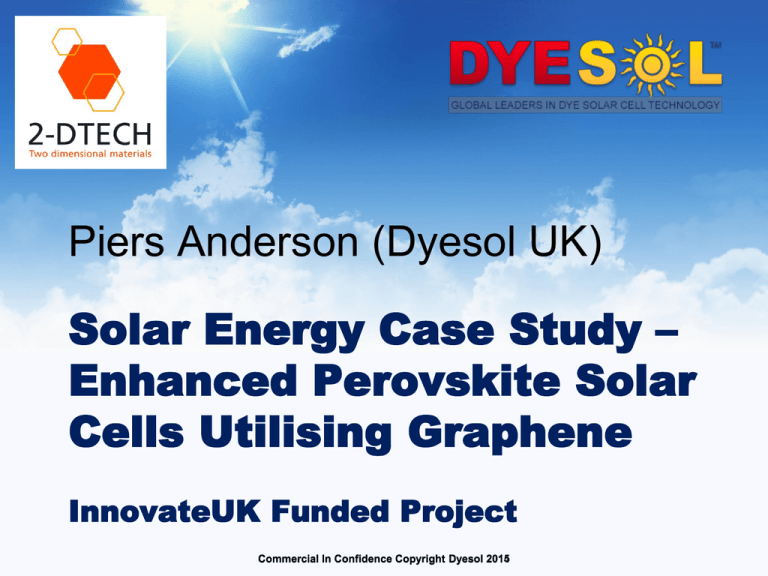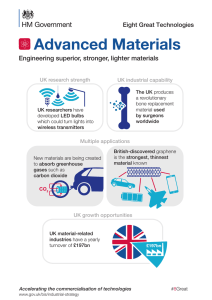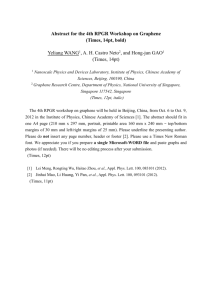Solar Energy Case Study – Enhanced Perovskite Solar Cells Utilising Graphene
advertisement

Piers Anderson (Dyesol UK) Solar Energy Case Study – Enhanced Perovskite Solar Cells Utilising Graphene InnovateUK Funded Project Commercial In Confidence Copyright Dyesol 2015 2014 Technology Status Contents Dyesol & 2-D Tech Background Status of Perovskite Solar Cells • Efficiency • Architectures • Perovskite/Graphene Publications Graphene Technology (2-D Tech) • Material Production Technology Development • InnovateUK Funded Project • ‘Golden Triangle’ • Scale-Up Commercial In Confidence Copyright Dyesol 2015 2014 Dyesol Locations & Collaborations Dyesol UK Manchester Commercial In Confidence Copyright Dyesol 2015 2014 2-D Tech Ltd • Founded by the University of Manchester to commercialise Graphene manufacture and application in 2012 • Acquired by Versarien Ltd in 2014 as a core part of an advanced materials portfolio • Retains a strong R&D presence within the University of Manchester, link to NGI • Production and project management through core Versarien teams Lab Efficiency Trends EPFL EPFL BASF EPFL EPFL EPFL EPFL EPFL 10 EPFL 5 EPFL Efficiency 15 Sharp Liquid Liquid Trend Solid EPFL 20 NW SKKU Oxford Dyesol EPFL KRICT EPFL EPFL Oxford KRICT KRICT UCLA KRICT Status of Perovskite Solar Cells 0 1990 1995 2000 2005 Year Commercial In Confidence Copyright Dyesol 2015 2014 2010 2015 Perovskite Solar Cell Architectures Dynamic R&D area, range of different architectures (mesoporous, nanostructure, planar), tandem cells, etc. being investigated Wide scope to optimise different areas of architecture, large number of academic groups investigating layers within stack (EPFL, Oxford University, KRICT, SKK) Commercial In Confidence Copyright Dyesol 2015 2014 Architecture Methylammonium Lead Iodide perovskite sensitised all-solid-state submicron thin film mesoscopic solar cell with efficiency >15% TiO2/CH3NH3PbI3/Spiro The role of TiO2 Blocking layer Mesoporous TiO2 Titania nano-particles as e- conductor MALI as light absorber Spiro as h+ conductor Declared ŋ = 9.7% (1000W/m2) Commercial In Confidence Copyright Dyesol 2015 2014 Graphene Production • Commercial production of samples • ‘Gold standards’ • Three Core Graphene production processes established • CVD • Chemical exfoliation • Novel patented process • Access to the full range of university equipment, analytical techniques and expertise Material Production Production by removing elements from a large starting material. Assembly of a nanostructure from smaller elements. 2-DTECH – GRAPHENE PLATELETS Top down process Processes include (a) Exfoliation (a) Mechanical (b) Liquid phase Reduced Graphene Oxide 5-10 atomic layers <1000nm lateral <1% O2 (b) <4 atomic layers <100nm lateral 2-3% O2 © 2-DTech Ltd, 2015. All Rights Reserved CVD Graphene - Bottom Up - Large area coatings - High quality single layer graphene on a variety of substrates Graphene on SiO2 under optical microscope Recent Perovskite Solar Cell / Graphene Publications J.Am.Chem.Soc. (2014) Yang, et.al., Efficiency Enhancement of Perovskite Solar Cells through Fast Electron Extraction: The Role of Graphene Quantum Dots Nano Letters (2014) Nicholas, et.al., Low-Temperature Processed Electron Collection Layers of Graphene/TiO2 Nanocomposites in Thin Film Perovskite Solar Cells J.Mater.Chem.A (2014) Wang, et.al., Graphene Oxide as Dual Functional Interface Modifier for Improving Wettability & Retarding Recombination in Hybrid Perovskite Solar Cells Nano Energy (2015) Na, et.al., Highly Efficient & Stable Planar Perovskite Solar Cells with Reduced Graphene Oxide Nanosheets as Electrode Interlayers Nanoscale (2014) Sun, et.al., Efficient Planar Heterojunction Perovskite Solar Cells Employing Graphene Oxide as Hole Conductor Commercial In Confidence Copyright Dyesol 2015 2014 InnovateUK Funded Project Recent one-year InnovateUK SMART Award funding received by 2-D Tech, which facilitated the collaboration with Dyesol UK Investigation of a range of perovskite solar cell/graphene architectures, using graphene nanoplatelets and reduced graphene oxide Optimise parameters to improve solar cell efficiency Improvement in stability and durability of perovskite solar cells using graphene Encapsulation aspects, to improve moisture resistance of perovskite, lifetime of products for Building Integrated Photovoltaic (BIPV) applications Longer term aim to scale-up the technology, whilst retaining the high efficiency and improved performance, for R2R large scale devices Commercial In Confidence Copyright Dyesol 2015 2014 Technology Development Focus The ‘Golden Triangle’: • Efficiency • Low Cost • Durability Key R&D Focus: 1. Scale-Up 2. Durability Efficiency ? Durability Commercial In Confidence Copyright Dyesol 2015 2014 Low Cost Technology Development Scale-Up Designs Lab Designs • e.g., test cells Processes Materials Lab Materials Industrial Engineering • e.g., Panel layout and assembly Materials Scale-up • e.g., perovskite absorbers Lab Processes Commercial Designs Production Materials • 1000’s of square meters Process Development • e.g., paste formulation for screen printing Commercial In Confidence Copyright Dyesol 2015 2014 Industrial Processes Product Impacts for Market Perovskite solar cell and graphene are dynamic R&D areas, combine advantages of both materials, to further increase solar cell efficiency Understanding of stability and durability improvements that could be achieved, encapsulation aspect to avoid moisture Combination of expertise of Dyesol UK & 2-D Tech, to optimise technological advances, leading to scale-up, with support from InnovateUK funding Application of perovskite-based solar cells for BIPV Commercial In Confidence Copyright Dyesol 2015 2014 Thank You! Commercial In Confidence Copyright Dyesol 2014 Commercial In Confidence Copyright Dyesol 2015 Piers Anderson Dyesol UK Ltd UMIC – Incubator Building 48 Grafton Street Manchester M13 9XX Email: panderson@dyesol.com Commercial In Confidence Copyright Dyesol 2015 2014



